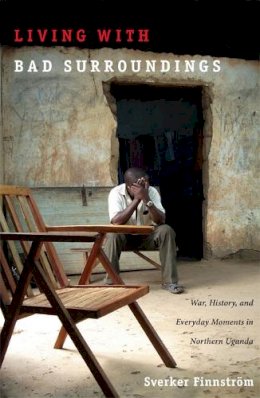
Living with Bad Surroundings: War, History, and Everyday Moments in Northern Uganda
Sverker Finnström
Finnström draws on fieldwork conducted in northern Uganda between 1997 and 2006 to describe how the Acholi—especially the younger generation, those born into the era of civil strife—understand and attempt to control their moral universe and material circumstances. Structuring his argument around indigenous metaphors and images, notably the Acholi concepts of good and bad surroundings, he vividly renders struggles in war and the related ills of impoverishment, sickness, and marginalization. In this rich ethnography, Finnström provides a clear-eyed assessment of the historical, cultural, and political underpinnings of the civil war while maintaining his focus on Acholi efforts to achieve “good surroundings,” viable futures for themselves and their families.
Product Details
About Sverker Finnström
Reviews for Living with Bad Surroundings: War, History, and Everyday Moments in Northern Uganda
Alicia C. Decker
International Journal of African Historical Studies
“[T]he book is still impressive in its historical and analytical scope, and is not only very readable, but also moving. The narrative voice vividly evokes the inter-subjectivity of the ethnographic experience. Living with Bad Surroundings is an essential reference for studies on northern Uganda, and is also accessible to a wider, non-specialist readership. The work also provides a valuable contribution to the ethnography of conflict as well to literature challenging the ‘breakdown’ paradigm of displacement.”
Matthew Wilhelm-Solomon
African Affairs
“At times poetic, often philosophical, Finnström brings the reader to a new level of insight into war and its effects on the lived realities of affected persons—and how and why it is possible for people to survive the impossible day by day. Equally important, he vividly connects these personal stories to the political domain, unveiling, as each chapter evolves, the politics that divide people. . .”
Erin K. Baines
African Studies Review
“This book is rich in detail and nuance, and challenges dominant discourses on the war in northern Uganda. It links the historical, international dimension to the lived experiences of the Acholi people. . . . [A] major book on everyday lived experiences in wartime. It adds to scholarship that interrogates colonial orthodoxies as well as academic writings that have produced stereotypes inimical to nation building. Finnstrom’s book is necessary reading for students of the Acholi, African wars, and Uganda.”
Steven Arojjo Obbo Ofumbi
Journal of Contemporary African Studies
“This is a highly accessible anthropological study of Northern Uganda and the LRA. It is useful in part because it establishes the colonial legacies though which the Acholi came to be marginalized in Uganda and stereotyped by the international community. Rather than basing his account on simplistic explanations like ‘ancient ethnic hatreds’ between the Acholi and other Ugandans, Finnström provides a rich array of interviews with Northern Ugandans that touch on cultural, historical, and political aspects of the war. In particular, he highlights the voices of young people, whom he says ‘did not passively wait for outside solutions; rather, in everyday life they built for a future despite displacement and social unrest.’”
Kristin Rawls
Christian Science Monitor
“Through a more explicit engagement with the ambiguities and unfinishedness of lived experience, ethnographies like Finnström’s Bad Surroundings may thus offer more than philosophy alone in making sense of governmentalization and subjectification as they unfold through individual, collective, and political life.”
João Biehl and Ramah McKay
Anthropological Quarterly
“Living with Bad Surroundings . . . [is] a very good book, perhaps the best written on northern Uganda since the 1970s. It will be an ideal text for courses dealing with Africa and the local realities of modern armed conflicts.”
Tim Allen
TLS
“[An] insightful, compelling ethnography. . . . Finnström has important things to say about ethnographic intimacy, the phenomenology of fieldwork, and the universality of culture as human existence. The book offers a fine example of the merits of local, detailed ethnographic knowledge for understanding civilian life in a warzone, as well as glimpses of the emotional connections an anthropologist forms with informants and collaborators.”
Catherine Besteman
American Ethnologist
“Finnström’s analysis of the factors involved in the devastating conflict in Northern Uganda between the Ugandan government and the Lord’s Resistance Army (LRA) is a valuable contribution to the literature on contemporary armed conflicts. . . . Finnström’s careful examination is essential for students, scholars, and practitioners who want to understand the political, economic, historical, cultural, and religious complexities involved in ay armed conflict.”
Joanne Corbin
African Studies Review
“I recommend it to anyone wanting to understand the problematic side of Africa. It reads more like the writing of a good and thoughtful war correspondent rather than a traditional social scientist. It what is useful and appropriate for understanding the world of contemporary northern Ugandans whom the author clearly liked and cared about.”
T.O. Beidelman
Anthropos
“This is a moving, politically engaged and penetrating study. It has . . . page-turning qualities. . . . If you are going to read just one book on northern Uganda, this is the one to go for.”
Tim Allen
Africa
